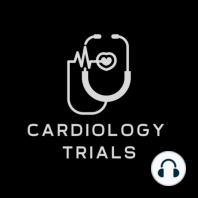8 min listen
Review of the CAPRICORN Trial
ratings:
Length:
10 minutes
Released:
Feb 6, 2024
Format:
Podcast episode
Description
Lancet 2001;357:1385-90.Background While beta blockers were frequently used in patients with acute myocardial infarction complicated by heart failure, at the time the CAPRICORN trial was undertaken, supportive evidence from contemporary, large scale randomized trials was lacking. The BHAT and ISIS-1 trials, reviewed in this section, were published in 1982 and 1986, respectively; before contemporary therapies like thrombolysis/revascularization and ACE-inhibition had been established. These early trials also excluded patients with overt heart failure or those who had concerning signals, such as soft hemodynamics. The CAPRICORN trial sought to test the hypothesis that early initiation of carvedilol in patients with AMI complicated by heart failure and LV dysfunction would reduce morbidity and mortality compared to placebo.Cardiology Trial’s Substack is a reader-supported publication. To receive new posts and support our work, consider becoming a free or paid subscriber.Patients Eligible patients were 18 years or older with a stable, definite myocardial infarction occurring 3-21 days prior to randomization with either a left ventricular ejection fraction of ≤40% or a wall motion index score of ≤1.3 and who were receiving an ACE inhibitor for at least 48 hr and were on a stable dose for at least 24 hr. Patients could have received IV diuretics during the acute phase but were excluded if they continued to require IV diuretics or inotropes or had uncontrolled heart failure. Other reasons for exclusion included unstable angina, SBP <90 mmHg, heart rate <60 bpm or unstable insulin dependent diabetes. Patients with any other indication to receive beta blockers were also excluded as were individuals on inhaled beta 2 agonists or steroids.Baseline characteristics The average age of patients was 63 years and over 70% were men. Approximately one third of patients had a prior MI, more than 20% had diabetes and 50% had hypertension. The average ejection fraction was 32% and over half of patients had an anterior MI. Patients were hemodynamically stable with an average blood pressure slightly above 120/70 mmHg and heart rate of 77 beats per minute. Nearly 50% of patients underwent thrombolysis or angioplasty for the primary MI and, at the time of randomization, 98% of patients were on an ACE inhibitor and 86% were on aspirin.Procedures Patients received either carvedilol or an identical placebo. Study medication was titrated up to the highest tolerated dose for each patient, to a maximum of 25 mg twice daily. The initial dose was 6.25 mg twice daily. If not tolerated, it was re-administered or reduced by half. If that dose was not tolerated the patient received no study medication but was followed up anyway. After successful initial dosing the patient returned as an outpatient every 3-10 days for assessment of tolerability and further up-titration. In the absence of adverse events or clinical heart failure and if the heart rate was >50 bpm and the systolic BP was >80 mmHg, the dose was increased to the next level. The patient remained in the outpatient department for 2hr to ensure that no side effects ensued.During the maintenance period patients were reviewed every 3 months during the first year and every 4 months thereafter. Investigators were encouraged to review the dose of study medication at every visit and to ensure that doses of other drugs, especially ACE inhibitors, were adjusted accordingly to achieve optimum dose levels.Endpoints The original primary endpoint was all-cause mortality and the trial was intended to run until a total of 633 primary endpoint events occurred. However, during a masked analysis the data and safety monitoring committee noted that overall mortality was lower than predicted and that the study could not be completed with the original sample size and power as planned. The steering committee, therefore, designated co-primary endpoints. The first was a new composite primary endpoint of all-cause mortality or card
Released:
Feb 6, 2024
Format:
Podcast episode
Titles in the series (40)
Review of the GISSI-1 Trial by Cardiology Trials
